新外研版八年级英语下册初二知识点总结
(外研版)初中英语笔记初二(下)
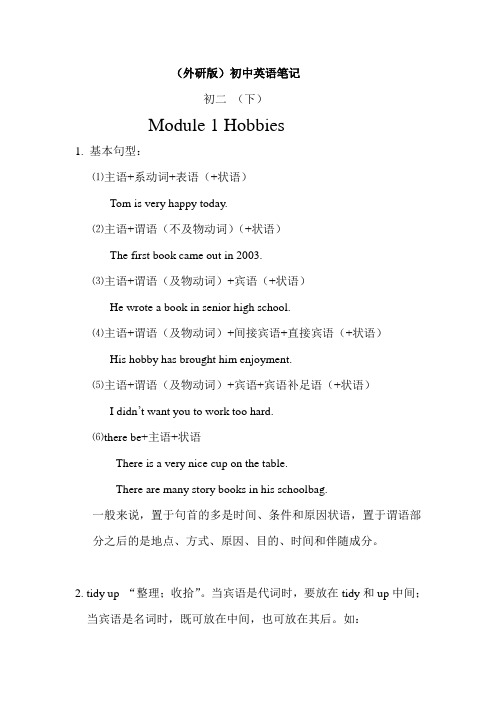
(外研版)初中英语笔记初二(下)Module 1 Hobbies1. 基本句型:⑴主语+系动词+表语(+状语)Tom is very happy today.⑵主语+谓语(不及物动词)(+状语)The first book came out in 2003.⑶主语+谓语(及物动词)+宾语(+状语)He wrote a book in senior high school.⑷主语+谓语(及物动词)+间接宾语+直接宾语(+状语)His hobby has brought him enjoyment.⑸主语+谓语(及物动词)+宾语+宾语补足语(+状语)I didn’t want you to work too hard.⑹there be+主语+状语There is a very nice cup on the table.There are many story books in his schoolbag.一般来说,置于句首的多是时间、条件和原因状语,置于谓语部分之后的是地点、方式、原因、目的、时间和伴随成分。
2. tidy up “整理;收拾”。
当宾语是代词时,要放在tidy和up中间;当宾语是名词时,既可放在中间,也可放在其后。
如:Your room is untidy. Can you tidy it up?The students tidied up the classroom.(类似的还有turn on, turn off, put on, write down等动词+副词形式)3. listen to sb. do sth. 听见某人做某事。
I often listen to him play the violin.(类似于see, hear等后面可以接不带to的动词不定式)4. 当play后面接表示乐器的名词时,需要在该名词前加上定冠词the;如:play the piano, play the flute(笛子)当play后面接表示球类的名词时,该名词前不接任何冠词。
新外研版八年级英语(下册)重点知识点总结

外研版八年级英语下册重点知识点Module1语法:系动词:一是(be:am,is,are,been,was,were),一觉得(feel),一好像(seem),一保持(keep),三变化(turn,become,get),四起来(smell,sound,look,taste),后跟形容词..11.三到达:arriveat(小地方),arrivein(大地方),getto=reach注意:跟home,here,there等副词时,不加介词.12.quite相当,很,相当于very,区别,quitea../quitean..而very只能放在a/an后13.with有,带有;和…一起;使用等.反义词without14.lovely:令人愉快的,可爱的修饰人或物alovelyafternoon/girllively:活泼的,生动的alivelylesson:一堂生动的课16.四个花费:take:Ittakessb.sometimetodosth./Ittooksb.sometimetodosth.Spend:Sb.spendsometime/moneyonsthSb.spendsometime/money(in)doingsth.Pay:Sb.paysomemoneyforsth.cost:sthcostsb.somemoney.,暗示.注意:词数70左右。
Ihaveanetfriend.SheisfromSydney,Australia.Thegirlisfifteenyearsold.Sheisthinwithtwo bigeyes.Shehaslongfairhair.Sheisfriendlyandoutgoing.Shealwayshasabigsmileonherface.S helikesreadingandchattingontheInternetwithherfriends.Shesaidthatreadingmadehergrowup asaperson.IfeelveryhappywhenIchatwithher.Ilikemynetfriendverymuch.IhopeIcangotoSyd neytoseeheroneday.Module2语法:现在完成时:表过去发生或已经完成的某一动作,对现在造成的影响和结果,或持续到现在的动作。
外研版初中八年级英语下册所有重点知识考点全总结
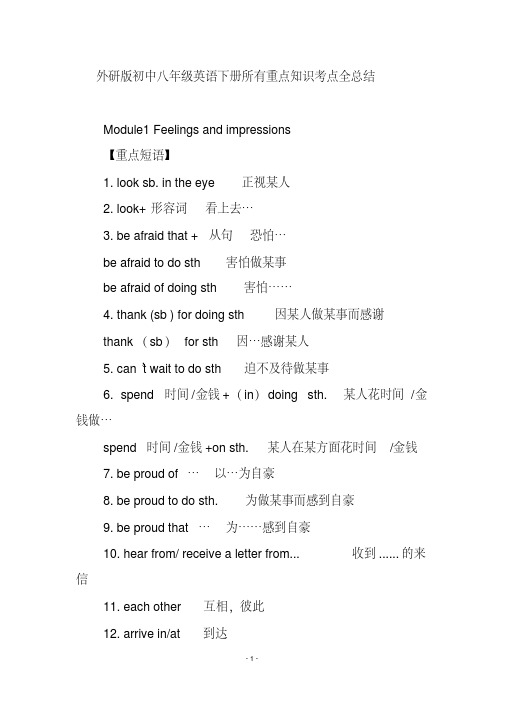
外研版初中八年级英语下册所有重点知识考点全总结Module1 Feelings and impressions【重点短语】1. look sb. in the eye 正视某人2. look+形容词看上去…3. be afraid that +从句恐怕…be afraid to do sth 害怕做某事be afraid of doing sth 害怕……4. thank (sb ) for doing sth 因某人做某事而感谢thank(sb)for sth 因…感谢某人5. can’t wait to do sth 迫不及待做某事6. spend 时间/金钱+(in)doing sth. 某人花时间/金钱做…spend 时间/金钱+on sth. 某人在某方面花时间/金钱7. be proud of…以…为自豪8. be proud to do sth. 为做某事而感到自豪9. be proud that…为……感到自豪10. hear from/ receive a letter from... 收到......的来信11. each other 互相,彼此12. arrive in/at 到达13. be good at 擅长,善于14. have a try 尝试15. on top 在上面,处于优势16. in the middle 在中间17. as well 也;还18. in the right way 以正确的方式19. be excited about 对...兴奋20. shake hands 握手21. close to 离......近【重点句型】1. 它闻起来不新鲜。
It doesn’t smell fresh.2. 每种东西都(尝起来)甜滋滋的。
Everything tastes so sweet.3. 多好闻的味道啊!What a delicious smell.4. ——你想来点尝尝吗?——好的,谢谢。
(完整版)外研版英语八年级下册知识点总结.docx
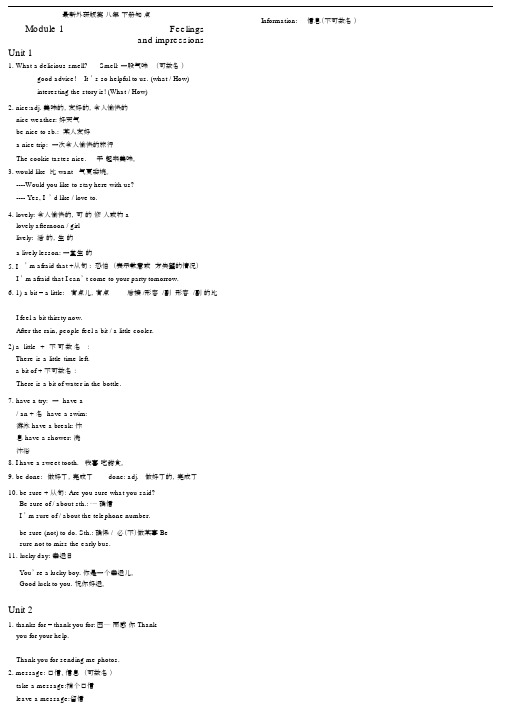
最新外研版英八年下册知点Information:信息(不可数名)Module 1Feelingsand impressionsUnit 11. What a delicious smell?Smell: 一股气味(可数名)_____ good advice! It ’ s so helpful to us. (what / How)_____ interesting the story is! (What / How)2.nice:adj. 美味的,友好的,令人愉快的nice weather: 好天气be nice to sb.: 某人友好a nice trip: 一次令人愉快的旅行The cookie tastes nice. 干起来美味。
3.would like 比 want 气更委婉。
----Would you like to stay here with us?---- Yes, I ’ d like / love to.4.lovely: 令人愉快的,可的修人或物 alovely afternoon / girllively: 活的,生的a lively lesson: 一堂生的5.I’ m afraid that +从句 : 恐怕(表示歉意或方失望的情况)I ’ m afraid that I can’ t come to your party tomorrow.6.1)a bit = a little: 有点儿,有点后接 /形容 /副形容 /副的比I feel a bit thirsty now.After the rain, people feel a bit / a little cooler.2)a little + 不可数名:There is a little time left.a bit of + 不可数名:There is a bit of water in the bottle.7.have a try: 一 have a/ an + 名 have a swim:游泳 have a break: 休息 have a shower: 洗沐浴8.I have a sweet tooth. 我喜吃甜食。
(完整版)外研版八年级下册Module8知识点整理

外研版八年级下册Module 8知识点整理一.重点单词hardly adv.几乎不;几乎没sights n.[用复数]风景;名胜thirsty adj.渴的waste v.&n.浪费;滥用kilometre n.千米;公里shape n.外形;形状human n.人wake v.唤醒;醒来somebody pron.某人;有人about adv.向四周;向各处path n.小路;路径pull v.(用手)拉,牵,扯二.重点短语1.time off休假2.in the city centre在市中心3.be famous for因……而著名4.take up占去(时间或空间)5.point out指出;指明6.at the top of.在……的顶端7.look like看起来像8.wake sb. up唤醒某人9.move about 四处走动10. not…any more不再11.do sightseeing 观光12. be careful小心13. be popular with受……欢迎三.用法集萃1.so...that+从句如此……以至于……2.welcome to+地点欢迎来到……3. hear sb. doing sth 听到某人正在做某事4. allow sb. to do sth 允许某人做某事5.promise to do sth.答应/许诺做某事6.without doing sth 没做某事7.hope to do sth希望做某事8.the+序数词十形容词最高级第几……的9. would like sb.to do sth. 想要某人做某事四.重点句型1.1 can hardly believe we're in the city centre.我几乎不能相信我们在市中心。
2.I don't think they allow people to swim in the lake.3.我认为他们不允许人们在湖里游泳。
新外研版英语八年级下册知识点与短语
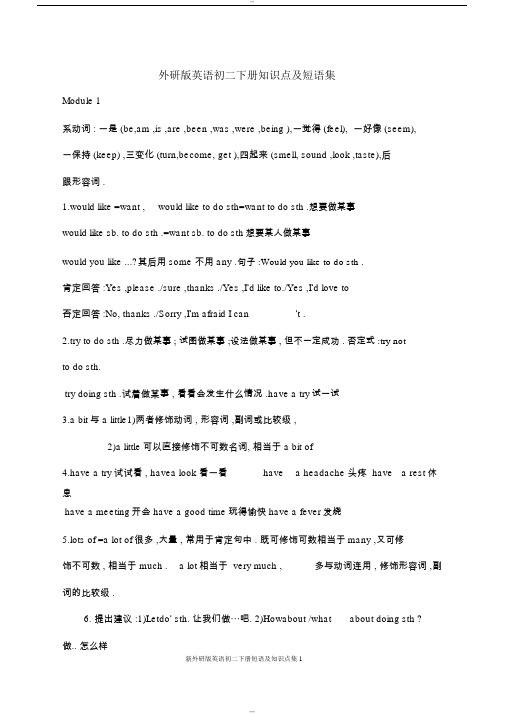
外研版英语初二下册知识点及短语集Module 1系动词 : 一是 (be,am ,is ,are ,been ,was ,were ,being ),一觉得(feel),一好像(seem),一保持 (keep) ,三变化(turn,become, get ),四起来(smell, sound ,look ,taste),后跟形容词 .1.would like =want , would like to do sth=want to do sth .想要做某事would like sb. to do sth .=want sb. to do sth想要某人做某事would you like ...?其后用some不用any .句子:Would you like to do sth .肯定回答 :Yes ,please ./sure ,thanks ./Yes ,I’d like to./Yes ,I’d love to否定回答 :No, thanks ./Sorry ,I’m afraid I can’t .2.try to do sth .尽力做某事;试图做某事;设法做某事,但不一定成功.否定式:try notto do sth.try doing sth .试着做某事,看看会发生什么情况.have a try试一试3.a bit与a little1)两者修饰动词,形容词,副词或比较级,2)a little可以直接修饰不可数名词, 相当于 a bit of4.have a try试试看, havea look 看一看have a headache 头疼 have a rest休息have a meeting开会have a good time玩得愉快have a fever发烧5.lots of =a lot of很多,大量,常用于肯定句中.既可修饰可数相当于many ,又可修饰不可数 , 相当于 much . a lot相当于very much ,多与动词连用,修饰形容词,副词的比较级 .6. 提出建议 :1)Letdo’ sth. 让我们做⋯吧. 2)Howabout /what about doing sth ?做.. 怎么样3)Why not do sth ?为什么不⋯ ?4)Would you like to do你愿意做⋯?.吗?5)Shall we do我们⋯?做⋯好吗?6)You’ d better(not) do ..你最好(不)做某事.7.Thanks for sth. =Thank you for sth.因⋯而感谢.后V+ing . Thanks to幸亏,由于,归功于 .8.leave a message留个口信 , take/have a message for sb.给某人带个口信 .9.hear from sb.=get /receive a letter from sb . 收到⋯的来信 hear about /of得悉,听说Hear out听完 hear to同意10.can’ t wait to do sth . 迫不及待做某事wait for等候⋯,后接等待的对象 ,名词或代词wait to do sth .等着做某事11.三到达 :arrive at ( 小地方 ),arrive in( 大地方 ),get to=reach 注意 : 跟home ,here ,there等副词时 ,不加介词 .12.quite相当 , 很, 相当于 very, 区别 , quite a ../quite an .. 而 very只能放在 a /an后13.with有,带有 ;和⋯一起;使用等 . 反义词 without14. 穿 :dress , 后跟人 ,dress oneself, dress sb . put on穿上,强调动作,wear ,穿着,强调状态 .15.be sure确信,相信be sure of /about sth .相信/对某事有把握16. 四个花费 :take:It takes sb. some time to do sth. /It took sb .some time todo sth .Spend :Sb. spend some time on sth ./ Sb spend some time (in) doing sth/Sb.spend money on sth .Pay:Sb. pay some money for sth.cost :sth cost sb .some money .17.四个也 :as well肯定,句末,不用逗号too,肯定,句末,逗号可有可无.either:否定句末 , also ,肯定句中,行前be后.18.proud .adj. be proud of为⋯而感到骄傲be proud to do sth .做某事很自豪 .pride. n. take pride in为⋯感到自⋯豪.;the pride of的骄傲⋯.19.How do you feel about对⋯感⋯?觉如何?与How do you like⋯?20.at first起初,开始,常位于句首或句末,反义词.at last最后,终于first of all ,首先,用作插入语,说明顺序,后接next ,then , at first ,指刚开始做某事的时候 , 暗示后来的情况有所改变.21.few /a few修饰可数名词,little /a little修饰不可数名词,有a表示有,没有a表示没有 .22.way的短语:in this way用这种方式, in the right way用正确的方法, the wayof 做 .. 的方式in the way 阻碍 , 妨碍 ; on the way to在去⋯的路上 by the way顺便说一下 .23.be afraid of害怕 , 后接名词 ,代词或动名词 be afraid to do sth .害怕做某事24.each other互相 25.be nervous about对⋯感到紧张26. 问外貌 :What+do/does /did + 主语 +look like ?问性格 :What +be +主语 +like ?27.be friendly to sb. 对某人友好 -28.be good at =do well in 擅长 , 后跟 doing sth .或名词。
八下外研版英语知识点梳理
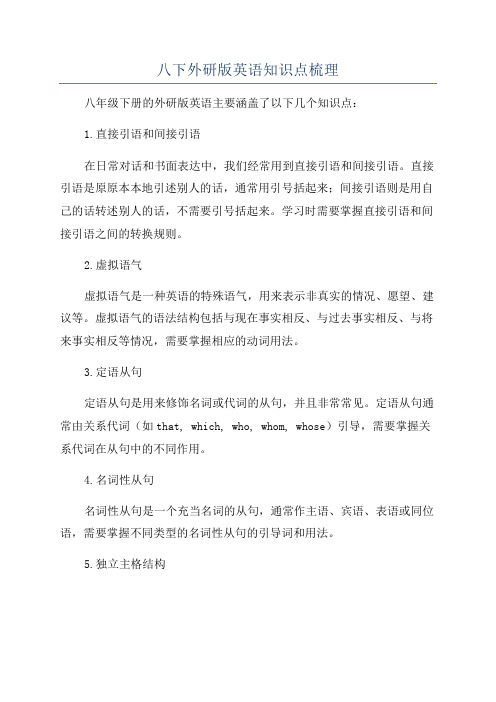
八下外研版英语知识点梳理八年级下册的外研版英语主要涵盖了以下几个知识点:1.直接引语和间接引语在日常对话和书面表达中,我们经常用到直接引语和间接引语。
直接引语是原原本本地引述别人的话,通常用引号括起来;间接引语则是用自己的话转述别人的话,不需要引号括起来。
学习时需要掌握直接引语和间接引语之间的转换规则。
2.虚拟语气虚拟语气是一种英语的特殊语气,用来表示非真实的情况、愿望、建议等。
虚拟语气的语法结构包括与现在事实相反、与过去事实相反、与将来事实相反等情况,需要掌握相应的动词用法。
3.定语从句定语从句是用来修饰名词或代词的从句,并且非常常见。
定语从句通常由关系代词(如that, which, who, whom, whose)引导,需要掌握关系代词在从句中的不同作用。
4.名词性从句名词性从句是一个充当名词的从句,通常作主语、宾语、表语或同位语,需要掌握不同类型的名词性从句的引导词和用法。
5.独立主格结构独立主格结构是一个形容词、名词或动词-ing 形式作主语,带有一个名词和一个介词短语。
独立主格结构通常用于句子的开头,也可以用于句子末尾,需要掌握相应的句子结构和用法。
6.过去完成时过去完成时是表示过去其中一时刻之前已经完成的动作或状态。
过去完成时的构成是had + 过去分词,学习时需要掌握它与其他过去时态的区别和正确使用。
7.被动语态被动语态是表示主语是动作的承受者,而不是执行者的句子。
被动语态的构成是be + 过去分词,学习时需要学会将主动句转为被动句,并正确使用被动语态。
8.宾语从句宾语从句是一个充当宾语的从句,通常由连接词that、if, whether等引导。
学习时需要掌握宾语从句的语法结构和连接词的用法。
9.定语从句中的非限制性定语从句非限制性定语从句是指对主句的名词或代词进行补充说明的定语从句,常由which引导。
学习时需要注意非限制性定语从句与限制性定语从句的区别,以及非限制性定语从句的标点符号使用。
外研版八年级下册语法知识点

外研版八年级下册语法知识点本文档将介绍外研版八年级下册涉及的主要语法知识点。
一. 动词的时态1. 一般现在时:表示经常性的行为、存在或事实;使用动词原形。
2. 现在进行时:表示正在进行的动作;使用be动词的现在分词形式+动词-ing。
3. 一般过去时:表示过去发生的动作;动词过去式。
4. 过去进行时:表示在过去某一时间正在进行的动作;过去式的be动词+动词-ing。
二. 名词性从句1. 主语从句:用作句子主语的从句。
2. 宾语从句:用作句子宾语的从句。
3. 表语从句:用作句子表语的从句。
4. 定语从句:用来修饰名词或代词的从句。
三. 动词的语态1. 主动语态:表示主语是动作的执行者。
2. 被动语态:表示主语是动作的承受者。
四. 状语从句1. 时间状语从句:表示时间的从句。
2. 地点状语从句:表示地点的从句。
3. 原因状语从句:表示原因的从句。
4. 结果状语从句:表示结果的从句。
五. 形容词和副词的比较级与最高级1. 形容词比较级:表示两者间的比较;原形+er。
2. 形容词最高级:表示三者或三者以上的比较;原形+est。
3. 副词比较级:表示程度上的比较;在副词前加more。
4. 副词最高级:表示程度上的最高水平;在副词前加most。
六. 陈述句、疑问句和祈使句的变化1. 陈述句:陈述事实、真理或观点;句子结构通常为主语+谓语动词+宾语。
2. 疑问句:用于问问题,通常以助动词、情态动词或疑问词开头。
3. 祈使句:用于表示请求、命令、建议等;直接使用动词原形开头。
以上是外研版八年级下册涉及的主要语法知识点。
希望对你有所帮助!。
外研版初中英语八年级下册知识点归纳总结
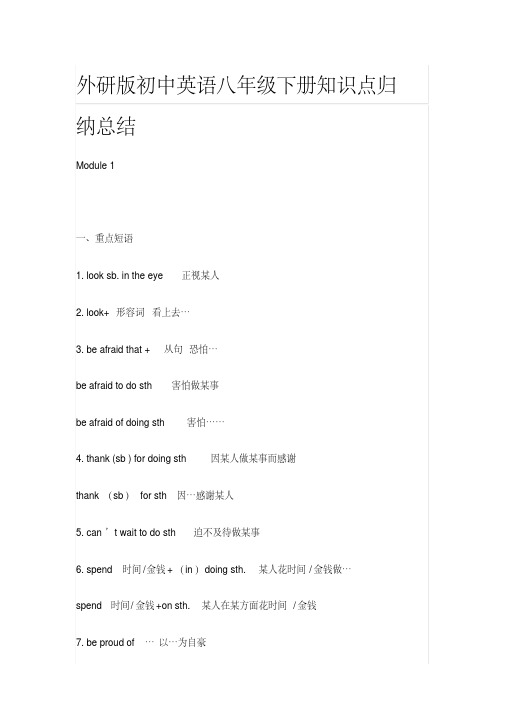
外研版初中英语八年级下册知识点归纳总结Module 1一、重点短语1. look sb. in the eye 正视某人2. look+形容词看上去…3. be afraid that +从句恐怕…be afraid to do sth 害怕做某事be afraid of doing sth 害怕……4. thank (sb ) for doing sth 因某人做某事而感谢thank(sb)for sth 因…感谢某人5. can’t wait to do sth 迫不及待做某事6. spend 时间/金钱+(in)doing sth. 某人花时间/金钱做…spend 时间/金钱+on sth. 某人在某方面花时间/金钱7. be proud of…以…为自豪8. be proud to do sth. 为做某事而感到自豪9. be proud that…为……感到自豪10. hear from/ receive a letter from... 收到......的来信11. each other 互相,彼此12. arrive in/at 到达13. be good at 擅长,善于14. have a try 尝试15. on top 在上面,处于优势16. in the middle 在中间17. as well 也;还18. in the right way 以正确的方式19. be excited about 对...兴奋20. shake hands 握手21. close to 离......近二、重点句型1. 它闻起来不新鲜。
It doesn’t smell fresh.2. 每种东西都(尝起来)甜滋滋的。
Everything tastes so sweet.3. 多好闻的味道啊!What a delicious smell.4. ——你想来点尝尝吗?——好的,谢谢。
---Would you like to try some? ---Yes, please.5. 我喜欢甜食。
外研版八年级英语下册知识点总结

Module 1 Hobbies重点词组1.Tidy up 收拾,整理2.take up占用(时间空间)3.be interested in 对…感兴趣(interesting 有趣的)4.as well as 并且,还I like playing football as well as playing basketball.5.such as 比如6 as a result 结果.7. come out 出版;开花;出来; 真相大白8. give an interview 接受采访,做访谈9. in the future 在未来(一般将来时)10. make sure 确保11. grow vegetables种蔬菜12. be good at sth./doing sth.13. a collection of …的收集品collect stamps集邮14. at the end of… at the beginning of…15. develop interests 发展兴趣16. useful skills 有用的技能17. play the violin 乐器加the18. all the time 总是,一直19. at least 至少20. be popular with 受…欢迎Football is popular with boys. 足球受男孩子的欢迎.21. * not only… but also不仅…而且用来连接两个主语时,注意就近原则Not only Da Ming but also his parents are fond of watching football matches.Not only you but also he is tired of having one examination after another.22. * spend +时间/金钱+on sth. / (in) doing sth.eg. I spent all our time on our favourate hobby. I spend the whole night (in) learning English.Their hobbies are drawing and painting. = In their free time, they like to draw and paint.23. * Succeed in doing sth. 成功做成某事success n. successful adj.24. * Make为使役动词, 后接形容词和动词原形做宾语补足语Eg. Rainy days make me sad.Loud music makes me want to dance.25. * It is +adj. + (for sb.) to do sth.(对某人来说)做某事是…的It’s important for you to remember this.It is +adj. + of sb. to do sth.形容词修饰人的性格如:It’s kind of you to tell me the truth.26. Try to do sth. 尽力做某事try doing sth. 尝试做某事27. Ask sb. (not) to do sth. 要求某人(不)做某事28. want sb. to do sth. 想要某人做某事Module 2 Friendship重点词组:1. right now 现在2. whether …or not3. hold the line (不挂断电话)等一下4. turn back 转身5. as usual 和往常一样6.close friends 亲密的朋友7. personal questions私人问题8. early autumn 早秋9. several months later 几个月以后10.worry about 担心11.at middle school 在初中12.smile at sb.朝某人微笑13.change one’s life 改变某人的生活14.at first 开始 15.join a club 参加俱乐部16. day by day 一天天地17. in different countries 在不同的国家18. feel like 觉得19. invite sb. to do sth. 邀请某人做某事20. by the way 顺便说一下21.like making friends (with) 喜欢交朋友22.take a message 捎口信23.a public concert 公开音乐会24.good luck with the concert 预祝音乐会成功25. remember doing sth./ to do sth.记得做了/去做某事26.as a result结果27. be afraid of sth./ to do sth. 害怕(去做)某事28. stamp collectors集邮爱好者29.a couple of 几个,两个30.take place 发生(happen)31. lonely寂寞的/alone 独自一人32.far away (from)33. watch,指仔细观看,看电视、球赛等see 指看望某人,看电影,看医生等34.______(laugh) at others is impolite. 取笑他人是不礼貌的35. all over the world 全世界Find sth. +adj. The foreigners find China very different from their own country. Find+ it +adj. +to do sth. I found it difficult to finish the work on time. It为形式宾语Find sb. doing sth. 发现某人正在做某事I found them playing games on the playground.People from all over the world make friends by writing letters. By通过…方式语法点:宾语从句注意点: 1. 有“…or not”或“or+供选择的内容”时,只能用whether2. 宾语从句的语序要用陈述语序3.客观真理用一般现在时4.注意时态宾语从句,即:在主句中担当宾语的从句。
八年级下册英语外研社各模块知识要点完整版

八年级下册英语外研社各模块知识要点完整版八年级下册英语外研社各模块知识要点Document serial number【NL89WT-NY98YT-NC8CB-NNUUT-NUT108】Module1FeelingsandimpressionsUnit11.whatadelicioussmell!本句是一个感叹句,感叹句的常见结构为:what+a\an+adj.+可数名词单数(+主语+谓语)! what+adj.+不可数名词\可数名词复数(+主语+谓语)!how+adj.(+主语+谓语)!Eg:Whatabeautifulgirl(sheis)!=Howbeautifulthe(girlis)!此外,smell在本句中作名词,表示“香味”。
2.nice:adj.美味的,友好的,令人愉快的niceweather:好天气benicetosb.:对某人友好anicetrip:一次令人愉快的旅行Thecookietastesnice.这块饼干尝起来美味。
3.wouldyouliketotrysomewouldlike比want语气更委婉Wouldyoulike……是一个表示请求的句型,句中用some\something,而不用any\anything。
还可用于wouldlikesth.\would(sb)liketodosth Eg:WouldyouliketogoshoppingwithmethisafternoonWouldyoulikes omethingtodrinktry(not)todosth尽力(不)去做某事tryon e’sbesttodosth尽某人最大努力去做某事. 4.lovely:令人愉快的,可爱的修饰人或物alovelyafternoon/girllively:活泼的,生动的alivelylesson:一堂生动的课5.I’mafraidthat+从句:恐怕(表示歉意或让对方失望的情况)I’mafraidthatIcan’tcometoyourpartytomorrow.6.1)abit=alittle:有点儿,有点后接/形容词/副词\形容词/副词的比较级Ifeelabitthirstynow.Aftertherain,peoplefeelabit/alittlecooler.2)alittle+不可数名词:Thereisalittletimeleft.abitof+不可数名词:ThereIsabitofwaterinthebottle.7.haveatry:试一试havea/an+名词haveaswim:游泳haveabreak:休息haveashower:洗沐浴8.Ihaveasweettooth.我喜欢吃甜食。
(完整版)八年级下英语(外研版)全部知识点总复习.docx

外研版八年英下册短知点集MODULE1五种句歌决英句,五种构型,句子后,构自分明,表主状,即主系表,主关与主,二者需分清,作象人和物,是加直,二位置可互,介to,for 心,句子已有主,再方完整,加上足,二者构成复合。
1、主+不及物(SV)不及物,不能,但有些要接状意才完整。
2、主 +系 +表( SVP)系: be ,look, seem ,become, feel , get ,turn ,grow,smell ,taste , keep, sound3、主+及物+(SVO)4、主 +及物 +接 +直接( SVOO)直接在前,加for 或 to 接接。
give, show , send, bring , pass, lend ,leave ,hand , feel, return, promise ,refuse, throw 用 to.make ,buy ,do ,get ,play ,order, sing, pay 用 for .5、主 +及物 + +足( SVOC)6、there be 句型。
tidy up 收拾,fan 扇, fan oneself ,某人自己扇,fan the flame 煽情, a movie fan , 影迷,un 反前,tidy-untidy, happy-unhappy ,comfortable-uncomfortable at least至少,祈使句,肯定以原形开,反用 will you ?/won’t you?,否定用 Don’t+原形,反用 will you ? ,Let’s⋯用 shall we?take up占据,代放中take away拿走 ,take sth. back,收回某物take ⋯.to ⋯把⋯到⋯.take off 脱下,起take place生 ,take a rest 休息一下 , a bit ,a little ,作状形/副可互a bit of =a little, 有点儿,修不可数名on time 按 ,in time 及 ,from time to time 有 ,a long time 很,for the first time 首次 ,have a good time 玩,得高be/get /become interested in主是人,某人某事生趣指人的不定代: somebody/someone, everybody/everyone , anybody/anyone, nobody/no one指物的不定代 ,anything, something, everything, nothing play the violin ; ,play +the+器, play+球,世上独一无二的加 the 前面出的再次出用 the make+ +足 (使..于某种状 ,地位 )make sb.do sth.使某人做某事, make sb/sth + 形使某人 /某物⋯后接不定式作,不要 to 的有,一感 feel,二听 hear, listen to ,三 have, let, make,四看 see, look at ,watch ,notice,半帮助 help,make sb. sth=make sth for sb.某人做某事, make money ,make a living 生, make trouble 引起麻,make friends with sb.与某人交朋友,make war开,make a fire 生火,make a face做鬼,make ..from 用..制成(用被)be made of用..制成(用被)make fun of 取笑,与⋯开玩笑,make roomfor ⋯地方, make up 造, make up one’s mind 决心,拿定主意,在完成:表去生或已完成的某一作,在造成的影响和果,或持到在的作。
(外研版)英语八年级下册总复习知识点考点
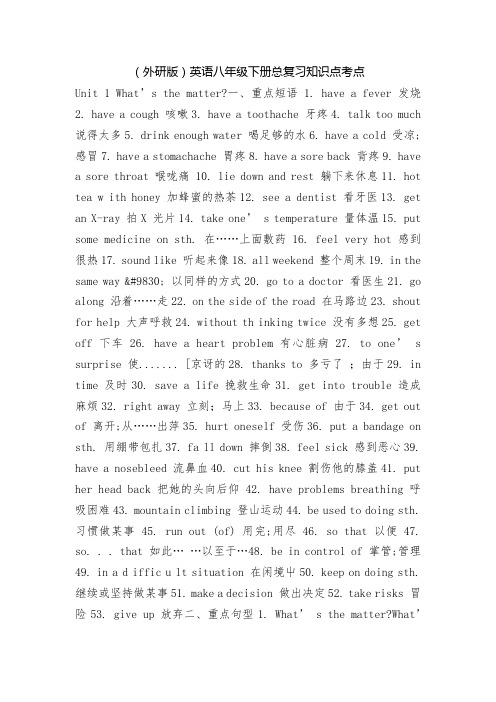
(外研版)英语八年级下册总复习知识点考点Unit 1 What’s the matter?一、重点短语 1. have a fever 发烧2. have a cough 咳嗽3. have a toothache 牙疼4. talk too much 说得太多5. drink enough water 喝足够的水6. have a cold 受凉;感冒7. have a stomachache 胃疼8. have a sore back 背疼9. have a sore throat 喉咙痛 10. lie down and rest 躺下来休息11. hot tea w ith honey 加蜂蜜的热茶12. see a dentist 看牙医13. get an X-ray 拍X 光片14. take one’ s temperature 量体温15. put some medicine on sth. 在……上面敷药16. feel very hot 感到很热17. sound like 听起来像18. all weekend 整个周末19. in the same way ♦ 以同样的方式20. go to a doctor 看医生21. go along 沿着……走22. on the side of the road 在马路边23. shout for help 大声呼救24. without th inking twice 没有多想25. get off 下车26. have a heart problem 有心脏病27. to one’ s surprise 使....... [京讶的28. thanks to 多亏了;由于29. in time 及时30. save a life 挽救生命31. get into trouble 造成麻烦32. right away 立刻;马上33. because of 由于34. get out of 离开;从……出萍35. hurt oneself 受伤36. put a bandage on sth. 用绷带包扎37. fa ll down 摔倒38. feel sick 感到恶心39. have a nosebleed 流鼻血40. cut his knee 割伤他的膝盖41. put her head back 把她的头向后仰42. have problems breathing 呼吸困难43. mountain climbing 登山运动44. be used to doing sth. 习惯做某事 45. run out (of) 用完;用尽46. so that 以便47. so. . . that 如此……以至于…48. be in control of 掌管;管理49. in a d iffic u lt situation 在闲境屮50. keep on doing sth. 继续或坚持做某事51. make a decision 做出决定52. take risks 冒险53. give up 放弃二、重点句型1. What’ s the matter?What’s the matter with you?= What’s the trouble with you?= What’s wrong with you?你怎么了?2. W hat should she do?她该怎么办呢?Should I take my temperature?我应该量一下体温吗?主语+ should/shouldn’t + 动词原形. ..①You should lie down and rest.你应该躺下休息一会儿。
(完整word版)外研八年级下册知识点、语法总结
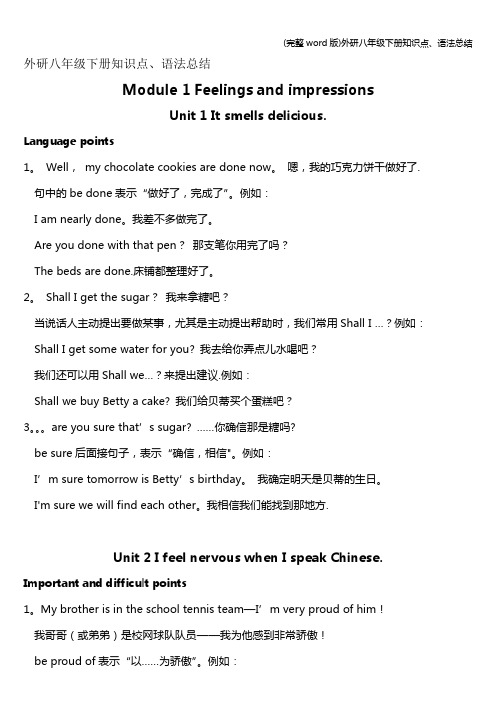
外研八年级下册知识点、语法总结Module 1 Feelings and impressionsUnit 1 It smells delicious.Language points1。
Well,my chocolate cookies are done now。
嗯,我的巧克力饼干做好了.句中的be done表示“做好了,完成了”。
例如:I am nearly done。
我差不多做完了。
Are you done with that pen?那支笔你用完了吗?The beds are done.床铺都整理好了。
2。
Shall I get the sugar?我来拿糖吧?当说话人主动提出要做某事,尤其是主动提出帮助时,我们常用Shall I …?例如:Shall I get some water for you? 我去给你弄点儿水喝吧?我们还可以用Shall we…?来提出建议.例如:Shall we buy Betty a cake? 我们给贝蒂买个蛋糕吧?3。
are you sure that’s sugar? ……你确信那是糖吗?be sure后面接句子,表示“确信,相信"。
例如:I’m sure tomorrow is Betty’s birthday。
我确定明天是贝蒂的生日。
I'm sure we will find each other。
我相信我们能找到那地方.Unit 2 I feel nervous when I speak Chinese. Important and difficult points1。
My brother is in the school tennis team—I’m very proud of him!我哥哥(或弟弟)是校网球队队员——我为他感到非常骄傲!be proud of表示“以……为骄傲”。
例如:We are so proud of her for telling the truth。
外研版八年级下的重点内容

一、重要语法知识:1. 感官动词的用法:(1)感官动词+形容词(2)感官动词+like+名词,2. be done被动语态3. 形容词性和名词性物主代词的区别4.Shall 常表将来,只能用在第一人称后Shall I…? 用于说话人主动提出帮助时Shall we…? 用于提建议二、重要词组:1. Be proud of 为…而自豪2. be excited about对…感到兴奋3. first of all首先4. be careful with小心对待…5. from now on从今往后6. in a hurry勿忙中7.thanks for +n.\ doing 感谢…8. hear from sb 收到某人的来信9.can’t wait to do sth 迫不及待做某事10.sb spend时间/金钱on sth\(in) doing sth某人花费时间/金钱做某事11. as well 也(放句尾)12. a bit+形容词一点a bit of+名词一、重要语法知识:1. 现在完成时的用法:(1) have done 对现在有影响(2) have been从过去一直持续到现在的状态(3) Have ever done曾经做过某事(4)have been to 和have gone to的区别(5)现在完成时的时间状语:already yet just for since的用法与区别等。
2. 区分:stop doing 停止正在做的事情stop to do 停止正在做的事去做另一件事二、重要词组:1. would like to do/want to do 想做某事2. make up编造,化妆3. count down倒数4. get on well with与…相处很好5. promise to do sth承诺做某事6. enter a competition 参加比赛7. invite sb to do sth 邀请某人做某事8. all over the world 世界各地一、重要语法知识:1. 一般将来时be going to/will/be doing的区别2.复习现在完成时的时间状语:already yet just for since的用法与区别等3. 现在完成时与一般过去时的区别二、重要词组:1. be up to正在做某事、正忙于做某事be up to sb由某人决定2. that’s why+从句这就是…的原因3. count down倒数4. get on well with与…相处5. promise to do sth承诺去做某事6. would like to do想去做某事Would like sth想要某物7. hundreds/ millions/ billions of8. go around 围绕…转9. it is impossible to do sth 做某事是不可能的10. adj+ enough 足够……enough+名词11. communicate with 与……沟通一、重要语法知识:1. 复习现在完成时for, since 区别2. 用how long 对现在完成时的提问3. 疾病的表达方式二、重要词组:1. do/ take exercise 做运动2. by doing sth 通过某种方式3. in (excellent) condition 健康状况良好out of condition 健康状况不佳4. be harmful to 对……有害5. such as 比如6. decide to do sth 决定做某事7. take part in 参加8. start to do/start doing 开始做某事9. take one’s temperature量某人的体温一、重要语法知识:1.多种基本时态的区别二、重要词组:1. can’t help doing sth 忍不住做某事2. win the heart of sb/ win sb’s heart 赢得某人的喜欢3. It’s time to do sth/for sth 是时候做某事4. keep doing sth 继续做某事5. each other 互相6. look+ adj 看上去……7. both of 两者都8. expect to do sth 期待做某事9. ever since 自从10. more than 多于,超过11. as well as 也,又,而且一、重要语法知识:1. 句子成份的划分2.pay, spend, take, cost 的区别3.interest/interested/interesting的区别二、重要词组:1. come out 出版,发行;显露,传出2. a bit of+ n 有点……3. look after =take care of 照顾,照料4. ask sb (not)to do sth 要求某人(不)做某事5. talk about 谈论6. encourage sb to do sth 鼓励某人做某事7. as a result 结果8. be interested in sth/ doing sth 对……感兴趣9. all the time 总是,一直10. run out of 用完,耗尽11. get ready for 为……作准备12. look forward to doing 期待做某事13. develop 发展,形成developed country发达国家developing country发展中国家一、重要语法知识:1.复习pay, spend, take, cost 的区别2. by/in/on the way及in this way的区别3.并列复合句:and, or, but, as well as等二、重要词组:1. by the way 顺便说一下2. form a friendship with sb 和某人建立友谊3. stay/keep in touch 保持联系4. prepare for 准备……5. make a list of 列……清单6. at the end of 在……结尾,在……末端in the end最终,最后7. what else 还有什么8. had better do sth 最好做某事9. forget to do sth 忘记去做某事10. have a great time 过得愉快11. at the same time 与此同时12. depend on 取决于……13. take part in 参加14. at least 至少15. fill out the form 填写表格16. stay/keep in touch with sb和某人保持联系一、重要语法知识:1. that引导的宾语从句二、重要词组:1. take up 占去(地方、时间等)2. point out 指出3. wake up 唤醒,弄醒;醒来4. so + adj + that +从句如此……以致5. be famous for 因……而著名be famous as 作为……而出名6. go for a swim=go swimming 去游泳7. allow sb to do sth 允许某人做某事8. at the top of 在……顶部9. promise(not) to do sth 承诺(不)做某事10. look like + n 看起来像look + adj 看起来Module 9一、重要语法知识:1. whether/if 引导的宾语从句2. whether与if 的区别二、重要词组:1. mention sth to sb 向某人说起某事2. be patient with 对……有耐心3. make friends with sb 与某人交朋友4. every time = each time 每次5. stay/keep in touch 保持联系6. at first 起初7. refuse doing/ to do sth 拒绝做某事8. regret doing sth 后悔做过某事regret to do sth 后悔做某事9. introduce sth to sb 向某人介绍某物10. encourage sb to do sth 鼓励某人做某事11. be afraid to do sth 害怕做某事be afraind of sth害怕…12. talk to sb 对某人谈话(一方讲一方听)talk with sb 与某人一起交谈(双方都讲话)13. day by day 日复一日,逐日14. smile at sb 对某人微笑laugh at sb 嘲笑某人15. in silence 安静地,无声地Module 10一、重要语法知识:1. 宾语从句的时态问题当主句是现在时态时,从句可根据实际情况选择不同时态当主句是过去时态时,从句一般使用相应的过去时态二、重要词组:1. on air 正在广播be on上演,播放2. it seems + that 从句看起来似乎……3. in person 亲自,本人4. avoid doing 避免做某事5. keep + adj 保持6. talk about 谈论7. agree to do sth 同意做某事agree with sb about sth关于某事同意某人8. and then 然后9. work on 从事……工作work for 为……工作10. be good at = do well in 擅长于……11. keep on doing 继续做某事。
最新外研版英语八年级下册知识点总结
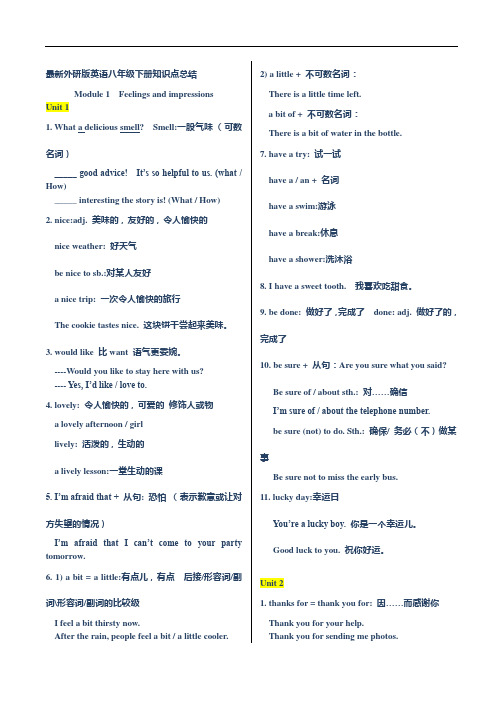
最新外研版英语八年级下册知识点总结Module 1 Feelings and impressionsUnit 11. What a delicious smell? Smell:一股气味(可数名词)_____ good advice! It’s so helpful to us. (what / How)_____ interesting the story is! (What / How)2. nice:adj. 美味的,友好的,令人愉快的nice weather: 好天气be nice to sb.:对某人友好a nice trip: 一次令人愉快的旅行The cookie tastes nice. 这块饼干尝起来美味。
3. would like 比want 语气更委婉。
----Would you like to stay here with us?---- Yes, I’d like / love to.4. lovely: 令人愉快的,可爱的修饰人或物a lovely afternoon / girllively: 活泼的,生动的a lively lesson:一堂生动的课5. I’m afraid that + 从句: 恐怕(表示歉意或让对方失望的情况)I’m afraid that I can’t come to your party tomorrow.6. 1) a bit = a little:有点儿,有点后接/形容词/副词\形容词/副词的比较级I feel a bit thirsty now.After the rain, people feel a bit / a little cooler. 2) a little + 不可数名词:There is a little time left.a bit of + 不可数名词:There is a bit of water in the bottle.7. have a try: 试一试have a / an + 名词have a swim:游泳have a break:休息have a shower:洗沐浴8. I have a sweet tooth. 我喜欢吃甜食。
(完整版)外研版八年级下册Module8知识点整理

外研版八年级下册Module 8知识点整理一.重点单词hardly adv.几乎不;几乎没sights n.[用复数]风景;名胜thirsty adj.渴的waste v.&n.浪费;滥用kilometre n.千米;公里shape n.外形;形状human n.人wake v.唤醒;醒来somebody pron.某人;有人about adv.向四周;向各处path n.小路;路径pull v.(用手)拉,牵,扯二.重点短语1.time off休假2.in the city centre在市中心3.be famous for因……而著名4.take up占去(时间或空间)5.point out指出;指明6.at the top of.在……的顶端7.look like看起来像8.wake sb. up唤醒某人9.move about 四处走动10. not…any more不再11.do sightseeing 观光12. be careful小心13. be popular with受……欢迎三.用法集萃1.so...that+从句如此……以至于……2.welcome to+地点欢迎来到……3. hear sb. doing sth 听到某人正在做某事4. allow sb. to do sth 允许某人做某事5.promise to do sth.答应/许诺做某事6.without doing sth 没做某事7.hope to do sth希望做某事8.the+序数词十形容词最高级第几……的9. would like sb.to do sth. 想要某人做某事四.重点句型1.1 can hardly believe we're in the city centre.我几乎不能相信我们在市中心。
2.I don't think they allow people to swim in the lake.3.我认为他们不允许人们在湖里游泳。
1.外研社八年级初二下册全册语法总结

Moudle2 语法:宾语从句宾语从句三注意,时态、语序、连接词。
主句一般现在时,从句时态随句意;从句表达是真理,从句时态一般现在时。
连接词要记清,陈述用that可省略;一般疑问用if或whether;特殊疑问用本身疑问词,绝不能省略。
还有一点要说明,陈述语序要记清。
宾语从句引导词有:that,if/whether,疑问词。
分别如下:1、陈述句变宾语从句(由that引导)当主句为一般现在时,从句可用任何一种时态;当主句为一般过去时,从句用过去相应的时态。
当从句陈述的是客观真理时,从句时态要用一般现在时。
如:1.She says that she will come.她说她会来。
(一般现在时)2. She said that she wanted to have a try. 她说过她想试一试。
(一般过去时)3.Teacher said the earth goes around the sun.老师说地球围绕着太阳转。
(客观真理)2、一般疑问句变宾语从句(由if或whether引导)如:Is it true?这是真的吗?(一般疑问句)→I wonder if it is true.我想知道是否是真的。
(宾语从句)注意:一般疑问句中的疑问语序要变成陈述语序,且whether常与or not连用。
3、殊疑问句变宾语从句(由本身的疑问词引导)如:Do you know? Where can I park my car?(两个特殊疑问句)→Do you know where I can park my car?(宾语从句)————————————————————————————————————Module 3语法: to +v.与 v.-in作宾语本模块主要介绍to +v.与 v.-in作动词宾语的情况.规律:一般来说,不定式(to do)表示将来的动作或行为,而doing形式表示经常性的、一般性的动作或行为,及正在进行的动作或行为。
新外研版八年级英语下册重点知识点总结

外研版八年级英语下册重点知识点Module 1语法:系动词:一是(be: am ,is ,are ,been ,was ,were), 一觉得(feel),一好像(seem),一保持(keep) , 三变化(turn, become, get ), 四起来(smell, sound ,look ,taste), 后跟形容词.知识点:1.would like =want , would like to do sth=want to do sth . 想要做某事would like sb. to do sth .=want sb. to do sth 想要某人做某事would you like ...? 其后用some 不用any . 句子:Would you like to do sth .肯定回答:Yes ,please ./sure ,thanks ./Yes ,I ’d like to./Yes ,I ’d love to否定回答:No, thanks ./Sorry ,I ’m afraid I can ’t .2.try to do sth . 尽力做某事;试图做某事;设法做某事,但不一定成功.否定式:try not to do sth.try doing sth . 试着做某事,看看会发生什么情况.have a try 试一试3.a bit 与a little 1)两者修饰动词,形容词,副词或比较级,2)a little 可以直接修饰不可数名词,相当于 a bit of4.have a try 试试看, have a look 看一看have a headache 头疼h ave a rest 休息have a meeting 开会have a good time 玩得愉快have a fever 发烧5.lots of =a lot of 很多,大量,常用于肯定句中.既可修饰可数相当于many , 又可修饰不可数,相当级.较于much . a lot 相当于very much ,多与动词连用,修饰形容词,副词的比6.提出建议:1)Let ’s do让st我h.们做⋯吧. 2)How about /what about doing sth ? 做..怎么样3)Why not do sth ? 为什么不⋯? 4)Would you like to do 你愿意⋯做?⋯.吗?5)Shall we do 我⋯们?做⋯好吗?6)You ’d better(not) do你..最好(不)做某事.7.Thanks for sth. =Thank you for sth. 因⋯而感谢.后V+ing . Thanks to 幸亏,由于,归功于.8.leave a message留个口信, take/have a message for sb.给某人带个口信.9.hear from sb.=get /receive a letter from sb . 收到⋯的来信hear about /of 得悉,听说Hear out 听完hear to 同意10.can ’t wait to do sth迫.不及待做某事wait for 等候⋯,后接等待的对象,名词或代词wait to do sth . 等着做某事11.三到达:arrive at ( 小地方),arrive in ( 大地方),get to =reach 注意:跟home ,here ,there 等副词时,.不加介词12.quite 相当,很,相当于very,区别, quite a ../ quite an .. 而very 只能放在 a /an 后13.with 有,带有; 和⋯一起; 使用等.反义词without14. lovely: 令人愉快的,可爱的修饰人或物a lovely afternoon / girllively: 活泼的,生动的 a lively lesson: 一堂生动的课16.四个花费: take: It takes sb. some time to do sth. /It took sb .some time to do sth .Spend : Sb. spend some time/ money on sthSb. spend some time/ money (in) doing sth.Pay: Sb. pay some money for sth.cost : sth cost sb .some money .17.四个也:as well 肯定,句末,不用逗号too,肯定,句末,逗号可有可无.either: 否定句末, also ,肯定句中,行前be 后.18.proud .adj. be proud of为⋯而感到骄傲b e proud to do sth . 做某事很自豪.pride. n. take pride in为⋯⋯感.到自豪; the pride of 的骄⋯傲..19.How do you feel about对⋯⋯?感觉如何?与How do you like ⋯?20.at first 起初,开始,常位于句首或句末,反义词.at last 最后,终于first of all , 首先,用作插入语,说明顺序,后接next ,then , at first , 指刚开始做某事的时候,暗示后来.的情况有所改变21.few /a few 修饰可数名词,little /a little 修饰不可数名词,有a 表示有,没有 a 表示没有.22.way 的短语:in this way 用这种方式, in the right way 用正确的方法, the way of 做..的方式on the way to 在去⋯⋯的路上by the way 顺便说一下.15.be afraid of 害怕,后接名词,代词或动名词be afraid to do sth . 害怕做某事16.each other 互相25.be nervous about 对⋯感到紧张23.问外貌:What+do/does /did + 主语+look like ? 问性格:What +be +主语+like ?24.be friendly to sb. 对某人友好- 28.be good at =do well in 擅长,后跟doing sth . 或名词。
- 1、下载文档前请自行甄别文档内容的完整性,平台不提供额外的编辑、内容补充、找答案等附加服务。
- 2、"仅部分预览"的文档,不可在线预览部分如存在完整性等问题,可反馈申请退款(可完整预览的文档不适用该条件!)。
- 3、如文档侵犯您的权益,请联系客服反馈,我们会尽快为您处理(人工客服工作时间:9:00-18:30)。
外研版英语八年级下册知识点总结Module 1 Feelings and impressionsUnit 11. What a delicious smell? Smell:一股气味(可数名词)_____ good advice! It’s so helpful to us. (what / How)_____ interesting the story is! (What / How)2. nice:adj. 美味的,友好的,令人愉快的nice weather: 好天气be nice to sb.:对某人友好a nice trip: 一次令人愉快的旅行The cookie tastes nice. 这块饼干尝起来美味。
3. would like 比want 语气更委婉。
----Would you like to stay here with us?---- Yes, I’d like / love to.4. lovely: 令人愉快的,可爱的修饰人或物a lovely afternoon / girllively: 活泼的,生动的a lively lesson:一堂生动的课5. I’m afraid that + 从句: 恐怕(表示歉意或让对方失望的情况)I’m afraid that I can’t come to your party tomorrow.6. 1) a bit = a little:有点儿,有点后接/形容词/副词\形容词/副词的比较级I feel a bit thirsty now.After the rain, people feel a bit / a little cooler.2) a little + 不可数名词:There is a little time left.a bit of + 不可数名词:There is a bit of water in the bottle.7. have a try: 试一试have a / an + 名词have a swim:游泳have a break:休息have a shower:洗沐浴8. I have a sweet tooth. 我喜欢吃甜食。
9. be done: 做好了,完成了done: adj. 做好了的,完成了10. be sure + 从句:Are you sure what you said?Be sure of / about sth.: 对……确信I’m sure of / about the telephone number.be sure (not) to do. Sth.: 确保/ 务必(不)做某事Be sure not to miss the early bus.11. lucky day:幸运日You’re a lucky boy. 你是一个幸运儿。
Good luck to you. 祝你好运。
Unit 21. thanks for = thank you for: 因……而感谢你Thank you for your help.Thank you for sending me photos.2. message: 口信、信息(可数名词)take a message:捎个口信leave a message:留信Information: 信息(不可数名词)a piece of information ,some information3. hear from sb.= get / receive a letter from sb. : 收到某人的来信I heard from my uncle last week.= I got / received a letter from my uncle last week.4. can’t wait to do sth. : 等不及/ 迫不及待做某事I can’t wait to open the present.5. quite:1) quite a / an + 形容词+ 名词quite a nice boy:一个相当好的男孩。
2) quite 修饰动词时放在动词前He quite likes maths. 他很喜欢数学。
very:1) a very + 形容词+ 名词a very nice boy2) very 与much合在一起修饰动词时,位于句末。
He likes English very much.6. sound like: 听起来(像)The music sounds very beautiful.7. 1) sb. spend some time/money (in) doing sth.:某人花费时间/钱做某事Don’t spend too much time (in) playing computer games.2) sb. spend some time / money on sth. :某人花时间/ 钱在某事/某物上I spent ten yuan on this book.Many people spned their free time on their hobbies.8. be proud of sb. / sth. : 以某人/ 某事为自豪Parents are proud of their children.We’re proud of our country.9. be good at sth. / doing sth.= do well in sth. / doing sth. 擅长某事/ 做某事I’m good at English / swimming.= I do well in English / swimming.10. How do you feel about…?= What do you think of …?= How do you like…?How do you feel about the film?= What do you think of the film?11. in: 在多久之后,常用于将来时,对其提问用how soon--- How soon will you leave Beijing?--- I’ll come back in three days.12. how to do things: 疑问词+ 不定式,在句中可作主语、宾语、表语1) I don’t know what to do.= I don’t know what I should do. (作宾语)疑问词加不定式作宾语时可以转换成宾语从句。
2) When to hold the meeting hasn’t been decided. (作主语)3) His dream is how to be a good scientist. (作表语)4) I don’t know what to do.= I don’t know how to do it.13. 1) be afraid of sb. / sth. : 害怕某人/某物I’m afraid of doctors / dogs.2) be afraid of doing sth.: 害怕做某事I’m afraid of flying / going out at night.3) be afraid to do sth.: 害怕做某事I’m afraid to swim across the river.4) I’m afraid that: 恐怕I’m afraid that you must study hard.语法:表示感觉和知觉的系动词也称感官系动词1. 五个表示感觉和知觉的系动词与眼、耳、口、鼻、手相关系。
look, sound, taste, smell, feel + 形容词He feels tired after work.2. 感官系动词后可接介词like, like后常接名词。
His idea sounds like fun .3. 感官系动词的句型结构与be 不同,其否定形式和疑问形式要借助动词do。
The food tastes delicious.变成否定句→ The fo od doesn’t taste delicious.变成一般疑问句→ Does the food taste delicious?4. 持续系动词,用来表示主语继续或保持一种状况或态度,主要有keep, remain, stayThe weather will keep warm for 7 days.5. 变化系动词有become, grow, turn, get, go等。
书面表达在英语学习中,与北京阳光中学的同学朝夕相处,其中Daniel的善良和助人为乐等优秀品质给我们留下了深刻的印象。
请根据下面提示,用英语写一篇短文。
提示:1.Personality: helpful—help old woman cross the road kind—work at the Helping Hands Clubcreative—creative a TV programme点拨:人物介绍(年龄、外貌、身份、性格)→ 典型事例(性格、品质)→人物评价(喜爱、夸赞)My friend DanielMy friend Daniel comes from Beijing Sunshine Secondary School. He has a round face and often wears a pair of glasses. He is good at playing computer games, but he dislikes sports. He has many good personal qualities. He is helpful. He often helps his classmates with the homework. He also helps old woman cross the road. He is kind to others. He works at the Helping Hands Club. He is creative. For example, he can create a TV programme. He is generous to his friends. He likes to share his things with them. So I want to be a person like Daniel from now on and get on well with everyone.Module 2 ExperiencesUnit 11. 1) enter = take part in = join in 参加enter a competition: 参加比赛2) enter = come / go into 进入Please enter the classroom.2. ever: 曾经、从来,用于现在完成时的一疑问句、否定句。
